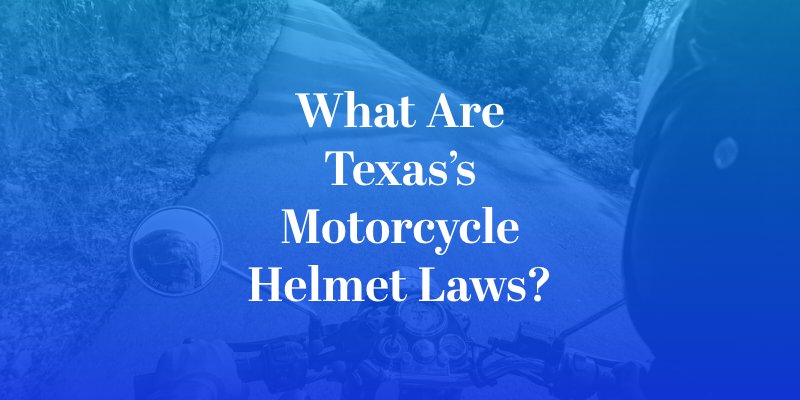Yes, you can still have a case and be eligible for financial compensation from another party if you were not wearing a motorcycle helmet at the time of your accident in Texas. Since failing to wear a helmet was not the cause of the crash, the party that did cause the accident can still be held responsible. However, a lack of helmet use could be used against you by an insurance company to try to reduce your payout. Speak with an experienced motorcycle accident lawyer in San Antonio for legal guidance.

In Texas, motorcyclists are legally required to wear a helmet that meets federal safety standards under the Department of Transportation if they are under the age of 21 (Chapter 661 of the Texas Transportation Code).
Any motorcycle rider or passenger who is at least 21 years old and has either 1) completed a motorcycle safety course or 2) purchased at least $10,000 in medical insurance can ride without a helmet. Even if you are not a mandatory wearer, helmet use is strongly recommended by safety experts to prevent serious and fatal injuries in motorcycle accidents, such as traumatic brain injuries.
Does Not Wearing a Helmet Mean I Don’t Qualify for Insurance Benefits?
Your decision not to wear a helmet does not automatically disqualify you or your passengers from financial compensation for a motorcycle accident in Texas. Whether or not you were legally required to wear a helmet under Texas law, not doing so does not bar you from recovering financial compensation if someone else is at fault for the accident.
Under Texas’s fault-based insurance law, if a motor vehicle driver or a third party was negligent (failed to act with proper care) and this caused the motorcycle accident, the negligent party can be held financially responsible. The party at fault will be required to pay for the injured motorcyclist’s medical bills, property damage and other related losses. This is the case even if the motorcyclist was not wearing a helmet.
Could Not Wearing a Helmet Affect My Case?
It is important to note that while the lack of a helmet while riding your motorcycle does not mean you won’t qualify for compensation, it could reduce the value of your insurance claim. Failing to wear a helmet may diminish your settlement under Texas’s comparative negligence law.
The modified comparative negligence rule in Texas states that if an individual shares fault for his or her injuries, this will reduce any compensation awarded by an equivalent percentage. If a plaintiff is more than 50 percent at fault, however, he or she is barred from any financial recovery.
How Helmet Use Affects a Claim Depends on the Circumstances
Whether or not you are wearing a helmet will matter more if the injuries you are claiming likely could have been prevented by helmet use. If you are pursuing compensation for head trauma, facial injuries or a brain injury, for example, expect an insurance company to argue that you contributed to your injuries by choosing not to wear a helmet.
An automobile insurance company can use the fact that you weren’t wearing a helmet as a reason to push for a lower settlement, even if the accident was its policyholder’s fault. If the insurance company can show with medical evidence that your injuries were exacerbated due to a lack of a helmet, this could reduce your compensation award by the percentage of fault that is assigned to you.
If you were recently injured in a motorcycle accident and you were not wearing a helmet, contact an injury attorney in San Antonio for legal assistance. A lawyer can help you counter the helmet defense to maximize your payout as much as possible.
